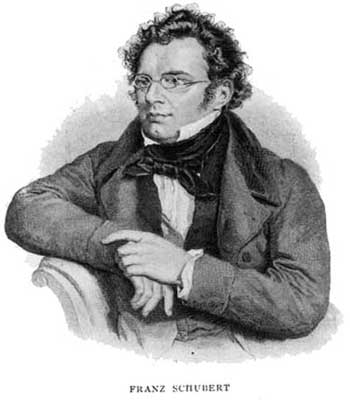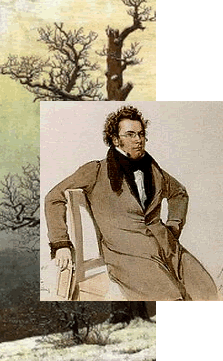

“Franz Schubert was born in 1797 into a musical family. As a young child, he learned piano and violin, and often participated in the daily informal music concerts which formed a central core to family life in his home. At the age of nine, he was accepted into the prestigious imperial chapel as a choirboy. it was at this time he began composing and conducting. After graduating from the choir school, he took a post as a school teacher, but left after four years. From that point on, Schubert had no regular income and depended greatly on the largesse and understanding of his many friends to survive. It is interesting to note that none of these friends resented this situation. Rather, many of them seemed very happy to help contribute to Schubert's obvious genius.
Living in a state of dependent poverty, Schubert managed to compose over the course of his lifetime a large amount of music for symphonies, chamber groups, string quartets, and solo instruments, but it is as a composer of songs that he is most often remembered. Schubert has been called " The father of Song" because of the heights to which he raised the composition of music for voice and Key board.

when Schubert first came across Winterreise, it was most likely in the library at Schober's house, where he was staying at the time. The texts were found in the almanac Urania fur 1823, and only the twelve poems which we know as the first half were printed there. It seems like Muller himself considered the work complete at the time the almanac was printed and it wasn't until 1824 that he revisited the work, including another 12 poems and reordering the entire cycle. When Schubert found the almanac, it was the year 1827, well after the Winterreise poetry had been completed in its final form. Believing the work to be complete in twelve poems, he started to work quickly, almost feverishly. "Inspired" seems insufficient to describe the effect of the poetry on him-"possessed" seems to be more fitting. He seemed to his friends to be distracted and depressed during the composition of his work - so much so that they were obviously worried about him. In due course the occasion came when the songs were presented to the group, but they were unprepared for the unrelenting melancholy of the work. Schubert, however, was undaunted by the reaction and told his friends that they would come to realize the power of these songs - he knew he had a masterpiece on his hands.
It hard to know how he felt later in the year when he found the 1824 edition of Muller's poems. He obviously had felt the cycle of 12 poems, to be a finished work, and here were not only another 12 poems, but the order of the poetry had been changed by the author! it would have been very difficult for him to change the ordering of the 12 songs, since there were already in the hands of the publisher. Instead of following Muller's order. Schubert simply took the twelve poems not yet set and set them in order in the second half. There are some who think this was a decision made entirely on expediency and argue for performing the cycle in the same order as Muller's. We feel, however, that Schubert had very good reasons for keeping the order of the original twelve songs, and fashioned the second half of the cycle to follow logically from the first. As an example of how tightly the first half is composed, listen to the piano accompaniment of Erstarrung and how Schubert refashions it in the first few bars of the following song, Der Lindenbaum - Listen again as the piano as the piano figure in the last verse of Der Lindenbaum becomes the introduction to the next song, Wasserflut. As the listener becomes more familiar with the cycle, other examples of this knitting of thematic materials will become apparent.
For one who reads the poetry in Muller's order and then follows the Schubertian order, It is obvious that the outcome for our protagonist is very different. Schubert's order is almost relentless, with our protagonist spiralling down through the cycle in a way from which there is no return - the only outcome is death - or madness. It is telling that the work was composed at a time when Schubert was coming to grips with the spectre of syphilis, with which he was infected and for which there was no cure. It is certain that he was looking at his own death in the near future, and that he was also influenced by the dealt of Beethoven in march or 1827.”